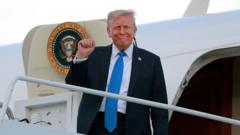Reflecting on the long overshadowed contributions of Jimmy Carter, we delve into his involvement in the cleanup after the Chalk River nuclear accident, a critical moment in both his life and American-Canadian relations.
Jimmy Carter’s Unseen Legacy: The Canadian Nuclear Cleanup

Jimmy Carter’s Unseen Legacy: The Canadian Nuclear Cleanup
A look into former President Jimmy Carter’s impactful yet underemphasized role in a major nuclear incident in Canada.
In the flood of tributes emerging after the passing of Jimmy Carter at the age of 100, an overlooked chapter of his career came back into focus, particularly regarding his role in the Chalk River nuclear accident in Ontario, Canada. This incident, which occurred in 1952, highlighted Carter's involvement in significant international affairs even before his presidency.
The New York Times revealed Carter’s maritime background, showcasing a piece of history that entails his training and qualifications as a naval officer. Among the curated objects that narrate his life, a certificate from Knolls Atomic Power Laboratory stands out; issued in 1953, it declared him an "atomic submariner." This title indicated Carter was not only skilled in his duties but also a crucial participant in advancing nuclear technology during a pivotal time in the Cold War.
At the U.S. Naval Academy from 1943 to 1946, he became the first in his family to graduate from college. His wartime experience on submarines propelled him into the domain of nuclear developments as he later contributed to the creation of the first nuclear-powered submersibles.
Carter's expertise positioned him as an essential contributor to the response team during the partial meltdown at Chalk River, wherein his naval training played a critical role in managing both the crisis and its aftermath. The legacy of his participation in this nuclear cleanup exemplifies how his earlier military career informed his later political decisions and prioritizations as president, especially concerning energy policy and safety.
As tributes continue to pour in, it is clear that Carter’s rich narrative encompasses not just his presidency but also the significant impacts of his previous military and engineering experiences on international cooperation and crisis management. The implications of his actions at Chalk River serve as a testament to the importance of foresight and responsibility in leadership, resonating through current debates about nuclear energy and safety.
The ties between America and Canada were indirectly strengthened through Carter's involvement, reflecting on the larger conversations about energy, safety, and environmental stewardship that still permeate diplomatic talks today. In commemorating his life, these lesser-known facets remind us of the complex interplay of military, political, and personal choices that shape a leader's legacy.
The New York Times revealed Carter’s maritime background, showcasing a piece of history that entails his training and qualifications as a naval officer. Among the curated objects that narrate his life, a certificate from Knolls Atomic Power Laboratory stands out; issued in 1953, it declared him an "atomic submariner." This title indicated Carter was not only skilled in his duties but also a crucial participant in advancing nuclear technology during a pivotal time in the Cold War.
At the U.S. Naval Academy from 1943 to 1946, he became the first in his family to graduate from college. His wartime experience on submarines propelled him into the domain of nuclear developments as he later contributed to the creation of the first nuclear-powered submersibles.
Carter's expertise positioned him as an essential contributor to the response team during the partial meltdown at Chalk River, wherein his naval training played a critical role in managing both the crisis and its aftermath. The legacy of his participation in this nuclear cleanup exemplifies how his earlier military career informed his later political decisions and prioritizations as president, especially concerning energy policy and safety.
As tributes continue to pour in, it is clear that Carter’s rich narrative encompasses not just his presidency but also the significant impacts of his previous military and engineering experiences on international cooperation and crisis management. The implications of his actions at Chalk River serve as a testament to the importance of foresight and responsibility in leadership, resonating through current debates about nuclear energy and safety.
The ties between America and Canada were indirectly strengthened through Carter's involvement, reflecting on the larger conversations about energy, safety, and environmental stewardship that still permeate diplomatic talks today. In commemorating his life, these lesser-known facets remind us of the complex interplay of military, political, and personal choices that shape a leader's legacy.






















